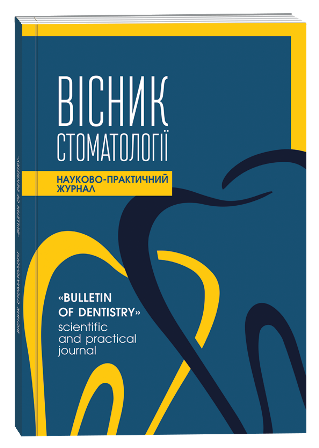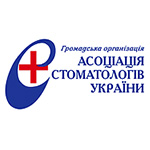EXPERIENCE OF THE PROJECTBASED LEARNING IN TEACHING PROSTHETIC DENTISTRY
DOI:
https://doi.org/10.35220/2078-8916-2024-51-1.31Keywords:
prosthetic dentistry, medical education, project-based learning.Abstract
Purpose of the study. To summarize the experience of implementing project-based training in teaching prosthetic dentistry to second-level higher education applicants at the Department of Prosthetic Dentistry of the Dnipro State Medical University. Main part. Project-based learning was implemented when fifth-year students wrote an educational medical history. The project was carried out during the academic year in a group of 2-3 applicants in four stages: organizational, research, technological, final. Curation of one thematic patient at least was mandatory. Data collection was also done using actual medical records, such as medical histories archives or computer databases. The analysis of clinical observations, supplemented with data from literary resources, turned the routine formulation of medical history into research work. The students were free to draw up a project realization plan; they distributed tasks independently, organized stepby- step actions with an indication of deadlines; collected data, determining the limits of information search; chose the project submission form. The presentation to the audience included the same sections for all performers, such as prevalence of disease, its etiology, pathogenesis, features of clinical picture, diagnostic process, treatment, prognosis, but all content and the form of its presentation (photos, diagrams, tables, etc.) were elements of the students' creativity. According to the results of questioning 52 fifth-year students who completed medical history as part of project-based learning, the most attractive feature of this technology was the possibility of communication with each other and with colleagues, in particular group discussions, brainstorming, and teacher’s professional consultations. The advantages of project-based learning are recognized as the ability to provide an individual educational trajectory to the student; learning to use knowledge of various origins to solve new practical tasks; constructive approach, when knowledge is built, not transferred. Difficulties in the successful implementation of the project consisted in the need for appropriate training of the teacher and the correct assessment of the project activities of the applicants. Conclusions. According to our experience, project-based learning in the teaching prosthetic dentistry allows students of second-level higher education not only to acquire basic knowledge, but also to ensure the formation of professional competences, communication skills, analytical thinking, research skills, and creative abilities. The method teaches the ability to self-educate, which is a guarantee of competitiveness in further professional activity. The effectiveness of the method depends on compliance with the rules of work organization at all stages of project implementation.
References
Morgan, A. (2006). Theoretical aspects of project-learning in higher education. British Journal of Educational Technology, 14 (1), 66–78. https://doi. org/10.1111/j.1467-8535.1983.tb00450.x.
Marnewick, C. (2023). Student experiences of project-based learning in agile project management education. Project Leadership and Society, 4, 1-10. https:// doi.org/10.1016/j.plas.2023.100096.
Zackariasson, P. (2014). Mentorship in academia. International Journal of Managing Projects in Business, 7 (4), 734–738. https://doi.org/10.1108/IJMPB- 05-2014-0040.
Zwikael, O., Meredith, J. R. & Smyrk, J. (2019). The responsibilities of the project owner in benefits realization. International Journal of Operations & Production Management, 39 (4), 503-524. https://doi. org/10.1108/IJOPM-02-2018-0086.
Lia, S.-Ch., Lee, M. R., Chen, Y.-L., & Chen, H. S. (2023). Application of project-based service learning courses in medical education: trials of curriculum designs during the pandemic. BMC Medical Education, 23, 696 https://doi.org/10.1186/s12909-023-04671-w.
Kim, K.-J. (2020). Project-based learning approach to increase medical student empathy. Medical education online, 25 (1), 1742965 https://doi.org/10.1080/10872981 .2020.1742965.
Nathwani, S. J., & Vedd, N. (2020). Medical students' perspective: project-based learning approach to increase medical student empathy. Medical education online, 25 (1), 1794342. https://doi.org/10.1080/1087298 1.2020.1794342.
Elkhamisy, F. A. A., Zidan, A. H., & Fathelbab, M. F. (2022). Using project-based learning to enhance curricular integration and relevance of basic medical sciences in preclerkship years. Alexandria Journal of Medicine, 58 (1), 1-7. https://doi.org/10.1080/20905068.2021.2009652
Qin, R., Salter, S. M., Clifford, R., Skull, S., & Lee, K. (2022). Can research training be improved in health professional student curricula? A qualitative descriptive study of health students’ experiences with an integrated research training platform. Medical Science Educator, 33, 49–62 https://doi.org/10.1007/s40670-022-01690-y.
Fastovets, O., & Kobylyak, S. (2023). Teaching prosthetic dentistry in the conditions of martial law and epidemiological threats. Visnyk stomatolohii, 122 (1), 148–152. https://doi.org/10.35220/2078-8916-2 023-47-1.24.









